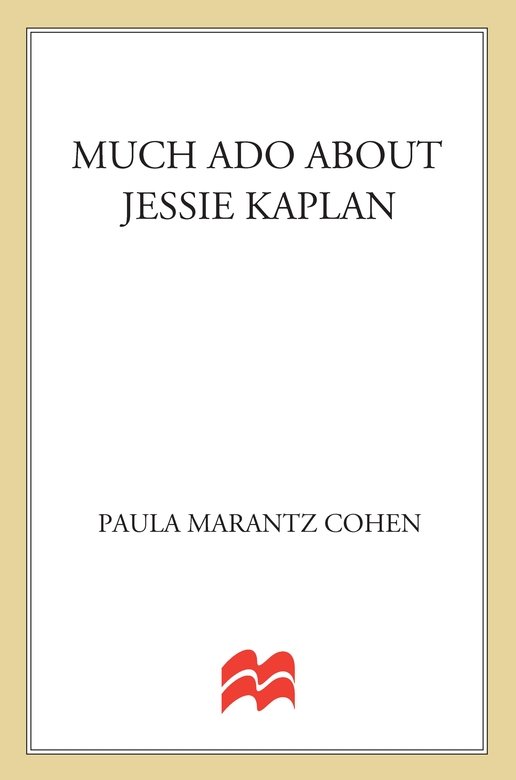Much Ado About Jessie Kaplan
Read Much Ado About Jessie Kaplan Online
Authors: Paula Marantz Cohen


Table of Contents
Title Page
Epigraph
Chapter One
Chapter Two
Chapter Three
Chapter Four
Chapter Five
Chapter Six
Chapter Seven
Chapter Eight
Chapter Nine
Chapter Ten
Chapter Eleven
Chapter Twelve
Chapter Thirteen
Chapter Fourteen
Chapter Fifteen
Chapter Sixteen
Chapter Seventeen
Chapter Eighteen
Chapter Nineteen
Chapter Twenty
Chapter Twenty-one
Chapter Twenty-two
Chapter Twenty-three
Chapter Twenty-four
Chapter Twenty-five
Chapter Twenty-six
Chapter Twenty-seven
Chapter Twenty-eight
Chapter Twenty-nine
Chapter Thirty
Chapter Thirty-one
Chapter Thirty-two
Chapter Thirty-three
Chapter Thirty-four
Chapter Thirty-five
Chapter Thirty-six
Chapter Thirty-seven
Chapter Thirty-eight
Chapter Thirty-nine
Chapter Forty
Chapter Forty-one
Chapter Forty-two
Chapter Forty-three
Chapter Forty-four
Chapter Forty-five
Chapter Forty-six
Chapter Forty-seven
Chapter Forty-eight
Chapter Forty-nine
Also by
Acknowledgments
Copyright Page
Epigraph
Chapter One
Chapter Two
Chapter Three
Chapter Four
Chapter Five
Chapter Six
Chapter Seven
Chapter Eight
Chapter Nine
Chapter Ten
Chapter Eleven
Chapter Twelve
Chapter Thirteen
Chapter Fourteen
Chapter Fifteen
Chapter Sixteen
Chapter Seventeen
Chapter Eighteen
Chapter Nineteen
Chapter Twenty
Chapter Twenty-one
Chapter Twenty-two
Chapter Twenty-three
Chapter Twenty-four
Chapter Twenty-five
Chapter Twenty-six
Chapter Twenty-seven
Chapter Twenty-eight
Chapter Twenty-nine
Chapter Thirty
Chapter Thirty-one
Chapter Thirty-two
Chapter Thirty-three
Chapter Thirty-four
Chapter Thirty-five
Chapter Thirty-six
Chapter Thirty-seven
Chapter Thirty-eight
Chapter Thirty-nine
Chapter Forty
Chapter Forty-one
Chapter Forty-two
Chapter Forty-three
Chapter Forty-four
Chapter Forty-five
Chapter Forty-six
Chapter Forty-seven
Chapter Forty-eight
Chapter Forty-nine
Also by
Acknowledgments
Copyright Page
To my sister, Rosetta
Although I draw on facts relating to the life and work of William
Shakespeare, this book is an act of imagination and fantasy and
not of literary or historical scholarship. In short, a great deal of
poetic license is taken with the subject matter. Please note as well
that any resemblance between characters in the novel and living
people is purely coincidental.
Shakespeare, this book is an act of imagination and fantasy and
not of literary or historical scholarship. In short, a great deal of
poetic license is taken with the subject matter. Please note as well
that any resemblance between characters in the novel and living
people is purely coincidental.
Â
âPaula Marantz Cohen
“
T
his one
LOOKS NICE.”
T
his one
LOOKS NICE.”
“I hate it!”
“How about this one?”
“No!”
Carla and Stephanie were leafing through a sample book in the fancy stationery store, trying to pick out an invitation for Stephanie's bat mitzvah.
Things were not going well.
What Carla liked, Stephanie hated, and what Stephanie liked, Carla couldn't help saying, “Are you sure that's what you want?”âa question guaranteed to drive any daughter crazy.
Carla hadn't thought that picking out an invitation would be so complicated. How hard could it be to choose a good paper stock with a colored border and some curly type?
But she had failed to take several things into account.
For one thing, invitations were not as simple as they used to be. Now, not only was there a dizzying array of paper stocks, borders, and typescripts to consider, but ornamental features like gold leaf, ribbons, and stars; whimsical inserts like confetti, whistles, and gold coins; and high-concept design elements like holograms, taped messages, and scratch-and-sniff panels.
Then, there was the additional complication posed by the bat mitzvah girl herself. Stephanie Goodman was at that highly sensitive and volatile age where choices of any kind tended to stress her out. The many trivial, hard-to-differentiate variables involved in picking out a bat mitzvah invitation were just the sort of thing liable to cause a meltdown.
“What's wrong with this one?” Carla held up a sample invitation with a pink border and a matching pink bow. A little packet of pink sparkles was also included as a “fun feature”âguaranteed to spray out when the envelope was opened, get embedded in the recipient's sweater, and remain there through numerous dry cleanings.
“Too girly,” pronounced Stephanie.
“And what's wrong with girly?” asked Carla, succumbing to sarcasm: “You're a girl, aren't you?” In point of fact, Stephanie and her friends liked to advertise their genderâwhat with the makeup, the tight-fitting tops, and the heavy dousings of cheap perfume that, in the words of Carla's husband, Mark, made the car (when he drove them to their favored destinations, Friendly's and Starbucks) smell like a French cathouse. Yet for some reason, certain tried-and-true artifacts of girlhood had been thrown by the wayside. The color pink was one of them.
“I like the turquoise,” said Stephanie, ignoring her mother's remark (in Stephanie's world, mothers weren't allowed to be sarcastic).
“That's nice.” Carla tried to sound noncommittal.
“You don't like it!”
“The turquoise is fine.”
“You're lying! You don't like it!”
“What does it matter what I like? It's what you like that counts.”
“I don't like the turquoise,” said Stephanie with sudden decisiveness. “I like this one.” She pointed to an invitation with pinkish trim and a pinkish bow, similar to the one Carla had just picked out.
“Lavender is very popular,” said the salesgirl diplomatically.
“Yes,” said Stephanie, glad to see her choiceâin actuality pinkâidentified as not pink. “I like the lavender.”
“So that settles it,” said Carla with relief.
“Lisa's invitation had her voice recorded in it,” Stephanie noted, not content to close the case so easily.
“We have speaking invitations,” said the salesgirl. “They're really neat.”
Carla felt like swatting the girl, whose skin-tight jeans and heavy eyelinerânot to mention the fact that she wasn't a day over twenty-threeâobviously gave her an unfair advantage. “No speaking invitations,” she said firmly. “Everyone we plan to invite knows how to read.”
“I was just asking!” said Stephanie. “I wasn't necessarily saying I had to have them.”
“Well, you aren't going to.”
“I didn't say I wanted them. I was just asking.” Stephanie's voice had grown shrill but she managed to mutter under her breath, “You're so mean! I hate you!”
Carla held herself back from responding. All the books said that the teenagers' goal was to get the parents angry and on the defensive. It was important not to let them winâor at least know they had. Carla pursed her lips and handed the salesgirl her credit card.
“Do you have a ballpark figure of how many you plan to send out?” asked the salesgirl sweetly.
Carla sighed and shook her head. The original plan had been for a modest brunchâthe modest brunch being the common starting point for all bar and bat mitzvahs, though none ever seemed to take this form. In the Goodmans' case, the brunch had been nixed by Mark's parents, who had argued that they and their friends weren't about to schlep up from Florida to have the event over on Saturday afternoon. Better to do an evening affair, with a nice spread for the out-of-towners the next morning to stretch things out.
Once an evening affair was settled on, other variables followed in inevitable succession: a sit-down meal, a band as well as a deejay, a prima-donna entertainment coordinator with entertainment facilitators in matching outfitsânot to mention high-end favors, prizes, and other specialty items that the bar mitzvah marketers stipulated as de rigueur for evening affairs.
“It takes on a life of its own,” said Carla's friend Jill Rosenberg, who was still recuperating from her son Josh's bar mitzvah a year ago. “But you don't want to fight it. If you resist, they make you feel guilty, so it's better to give in and go with the flow.”
Carla had taken Jill's advice and watched unprotestingly as the guest list grew and grew. Stephanie's list alone drew from three substantial constituencies: her camp friends, her middle-school friends, and her Hebrew-school friendsâeach group to be treated as inviolable and not to be mixed under any circumstances.
Mark's list was also substantial. He had to invite all the referring doctors in his hospital (or risk never getting a referral again) and those nurses who had dropped hints as to how they'd love to observe this wonderful Jewish ritual (or risk their developing weird scenarios as to what went on when so many Jews got together in one place).
Carla's mother, Jessie, planned to invite large contingents from both sides of her family. This included the highly sensitive Scarsdale Lubenthalsâto omit one was to bring down the ire of the entire clanâand the lively but disreputable Brooklyn Katzes, likely to show up with new spouses, a doubling effect in itself.
Carla's in-laws seemed intent on inviting practically everyone in their condominium community in Southeast Florida, including people they frankly detested.
“Invite them,” her mother-in-law said. “They won't come anyway and it'll make them feel bad for not inviting us to their grandchildren's.”
“But what if they do come?” Carla protested. She had learned from friends that people were unpredictable that way and you never
knew when someone might be in the mood to hop on a plane and go to a bat mitzvah. Just the other day she had heard a horror story about a woman who invited her husband's cousins in Venezuela, and had them all show up on her doorstep the morning of the affair.
knew when someone might be in the mood to hop on a plane and go to a bat mitzvah. Just the other day she had heard a horror story about a woman who invited her husband's cousins in Venezuela, and had them all show up on her doorstep the morning of the affair.
“If they come, you add a few more tables,” her mother-in-law counseled lightly. Carla's in-laws were always making such casual pronouncements, until they saw the bill and were appalled. Carla thought they might be suffering from a rare form of Alzheimer's in which their memory was affected only with regard to what things cost.
Finally, there was the associative principle attached to the invitations. This was the principle whereby asking X meant having to ask Y and Z, who would be mortally offended if they found that X was invited and they weren't. In short, each invitee immediately spawned two or three more, making compiling the guest list akin to the breeding of rabbits.
“How about a five-hundred-dollar down payment?” said the salesgirl, noting that Carla's eyes had glazed over at the prospect of giving an estimate. “We can make up the difference when you have the exact count.”
Carla said this would be fine.
“And if you need to change any of the options, we'd be more than happy to accommodate. It's such an important event; we want the bat mitzvah girl to have everything she wants.”
The salesgirl glanced slyly at Stephanie and her mother as she spoke. She was close enough to her own bat mitzvah to know that what the bat mitzvah girl wants wasn't always in line with what the mother of the bat mitzvah girl thinks is appropriate. The prospect of a clash of wills filled the air as she saw Carla and Stephanie dart angry looks at each other. It was nice to think that certain things remained the same, mused the salesgirl. Even as you grew older and the world changed around you, others followed in your footsteps and repeated the age-old patterns. That's what rituals were all about, weren't they?
Other books
The Dragon in the Cliff by Sheila Cole
The Sound of Thunder by Wilbur Smith
Red Knife by William Kent Krueger
Gods in Alabama by Joshilyn Jackson
An Accidental American: A Novel by Alex Carr
Madeleine Strays: A Wife-Watching Romance by Max Sebastian
Twenty Blue Devils by Aaron Elkins
How to Survive Summer Camp by Jacqueline Wilson
The Way of Wyrd by Brian Bates
Crushed (City of Eldrich Book 2) by Laura Kirwan